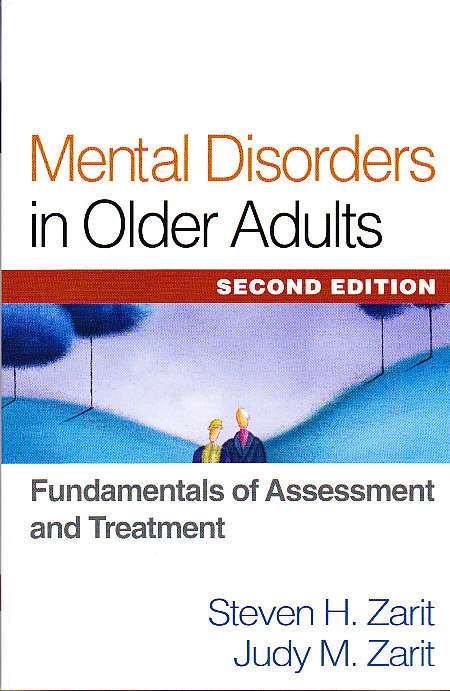


This course demonstrates how to evaluate and treat frequently encountered clinical problems in older adults, including dementias, mood and anxiety disorders, and paranoid symptoms. Strategies are presented for implementing psychosocial interventions and integrating them with medication.
Steven H. Zarit, PhD, is Professor and Head of the Department of Human Development and Family Studies in Pennsylvania State University, and is also Adjunct Professor at the Institute of Gerontology, Jonkoping University, Jonkoping, Sweden. He has conducted research on late-life issues, particularly family caregiving and adaptation for older adults.
Jody M. Zarit, PhD, has been in private practice in State College, Pennsylvania since 1986. She specializes in neuropsychological assessment of dementia and clinical interventions with older adults. Dr. Zarit also provides consultation services to nursing homes and assisted-living facilties.
After completing this course youíll be able to:
| 1. | Describe the optimistic picture of aging. |
| 2. | List several characteristics of the older population. |
| 3. | Discuss the cross-sectional study on "age differences." |
| 4. | Define terminal decline. |
| 5. | Define episodic, semantic, and procedural memory. |
| 6. | Describe growth curve modeling. |
| 7. | Define the dementia syndrome. |
| 8. | Discuss the cause and treatment for Alzheimers disease. |
| 9. | Discuss "vascular dementia" and list the symptoms. |
| 10. | Define a Lewy body. |
| 11. | Discuss delirium and the three patterns. |
| 12. | Discuss the prevalence and etiology of depression. |
| 13. | Discuss anxiety in the elderly. |
| 14. | Describe suicide in the elderly. |
| 15. | Compare early-onset, late-onset, and very-late-onset schizophrenia. |
| 16. | Define the three personality disorders. |
| 17. | State why personality disorders are difficult to diagnose. |
| 18. | Discuss alcohol and substance abuse in the elderly. |
| 19. | Discuss the principles of assessment. |
| 20. | Describe the initial interview. |
| 21. | Discuss the three symptoms explored in detail when there is a possibility of dementia. |
| 22. | List the three Parkinsonian syndromes. |
| 23. | List several special considerations when testing older people. |
| 24. | Describe the Wechsler Adult Intelligence Scale. |
| 25. | Describe several specific psychological tests. |
| 26. | Define competence and capacity. |
| 27. | Describe capacity evaluations. |
| 28. | Discuss empathy. |
| 29. | Describe cognitive-behavioral treatment. |
| 30. | List frequent themes in therapy. |
| 31. | List the three limitations from the review of empirical literature regarding treatment of older people. |
| 32. | Describe behavioral therapy by Lewinsohn. |
| 33. | Describe cognitive-behavioral treatment by Beck. |
| 34. | Describe interpersonal psychotherapy by Klerman and associates. |
| 35. | Discuss electroconvulsive therapy for depression. |
| 36. | Describe cognitive-behavioral therapy for anxiety. |
| 37. | Discuss anxiety in nursing homes and institutional settings. |
| 38. | Discuss sensory loss and paranoia. |
| 39. | Compare paranoid symptoms in delirium and dementia. |
| 40. | List several interventions for early-stage dementia. |
| 41. | Describe the problem-solving process for behavioral intervention. |
| 42. | Discuss the four major phases that characterize a caregiverís treatment approach. |
| 43. | Describe the principles of consultation. |
| 44. | List several environmental interventions for patients with dementia. |
| 45. | Discuss confidentiality and the exceptions. |
| 1. | Introduction: Clinical Practice with Older Adults |
| 2. | Normal Processes of Aging |
| 3. | Disorders of Aging: Dementia, Delirium, and Other Cognitive Problems |
| 4. | Mood and Anxiety Disorders |
| 5. | Other Common Mental Health Problems in Later Life |
| 6. | The Clinical Interview |
| 7. | Psychological Testing for Different Diagnosis and Capacity Evaluations |
| 8. | Foundations of Treatment |
| 9. | Treatment of Depression |
| 10. | Treatment of Anxiety Symptoms |
| 11. | Treatment of Paranoid Symptoms |
| 12. | Treatment of Dementia |
| 13. | Family Caregiving |
| 14. | Consultation in Institutional Settings |
| 15. | Ethical Issues in Geriatric Psychology |
| References | |
| Index |
"A rich guidebook for assessing and treating the most common mental disorders likely to be encountered by mental health professionals working with older adults . . . An exceptional contribution to the field."
"The insights [the authors] share with readers are clearly the result of many years of experience working with this client group."
"Provides excellent references and strong-clinical materials. The authors focus on function rather than disease and their use of clinical situations reinforces their emphasis on the importance of respecting the individual and family unit."
"Two accomplished practitioners and researchers offer a spirited and holistic approach to working with older adults. Their optimism will go a long way in inspiring our students and in helping established practitioners to take a fresh approach toward a range of problems."
"This book will serve as an excellent text for graduate students and beginning gerontologists, and I suspect it will stimulate many readers to enter the rewarding specialty of treating the elderly."
© 2007 - 2010 Homestead Schools, Inc. - Webmaster: ITSYS Solutions